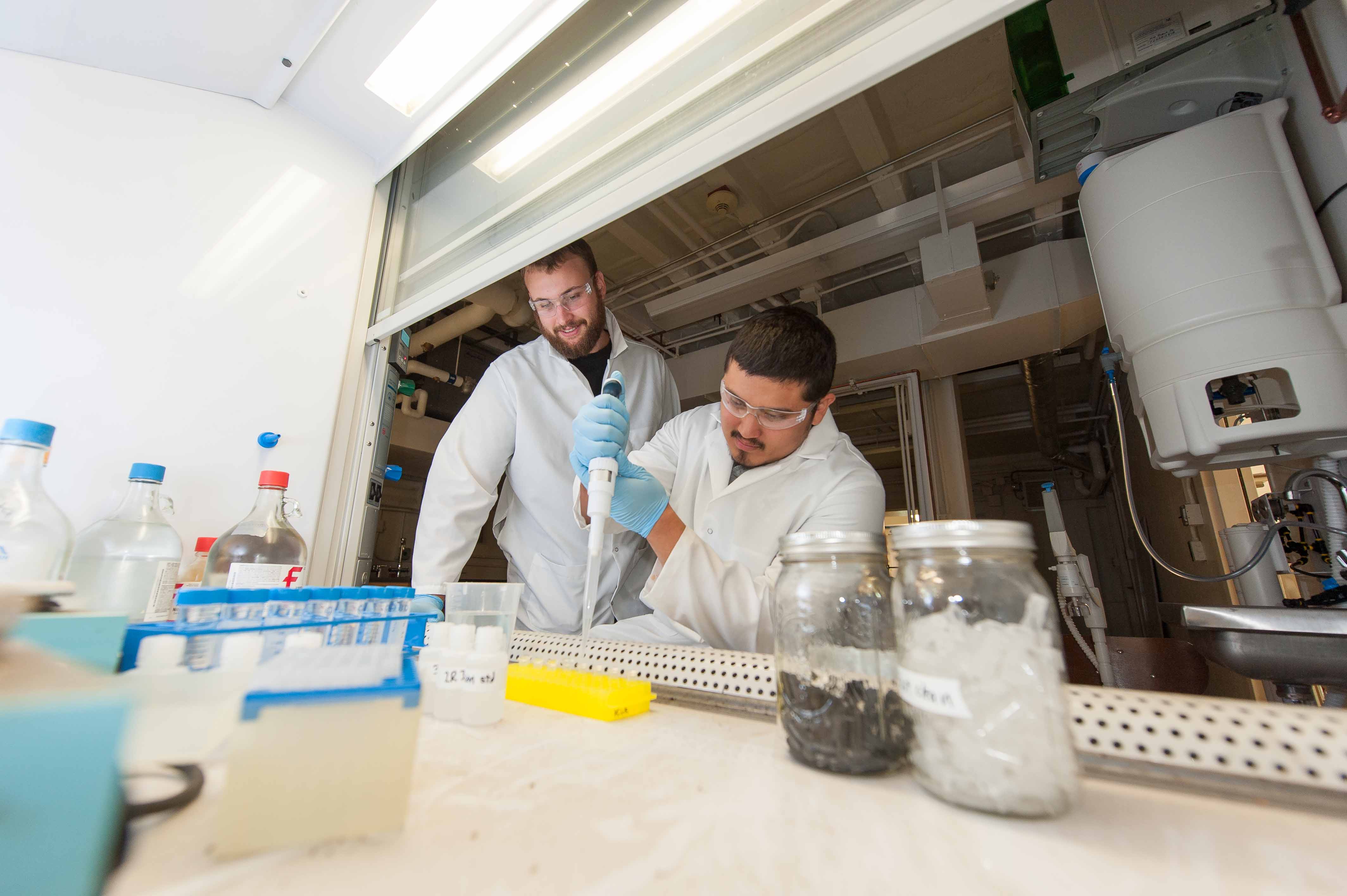
Research
Geology research extends further than just field work, we use our understanding of relative dating, surface water permeability, mineral identification and use of software processes to not only understand the past but to help build the future. Explore the links below to learn about experimental and theoretical research and our facilities that we have to offer.
Research Areas
Research foci
Energy and Mineral Resources
How will we responsibly acquire and transport oil and natural gas to fuel our nation? How will we evaluate and extract mineral resources? The department is asking questions about the biogeochemistry of unconventional natural gas reservoirs and geological carbon storage.
Earth Surface Processes and the Environment
K-State geologists want to know about the impacts of natural hazards, the quality and quantity of water resources, and how to predict and manage key processes in Earth's Critical Zone. How will environments respond to future stresses? What biological, geochemical, and geomorphic processes impact Earth's Critical Zone?
Evolution and Solid Earth
The Department of Geology is digging deep to better understand the processes that have shaped Earth's crust and mantle. How are magmas generated and how do they evolve? What are the links among tectonism, magmatism, and ore deposits? Research is uncovering processes of mantle evolution and geodynamics.
Faculty research areas
The table below provides a summary of research areas in our department. For non-geologists, it may be unclear how different subdisciplines of geology can be applied. For example, some of the geochemistry, geomicrobiology, and sedimentary geology research in our department is related to understanding climate, including modern controls on Earth's climate and past variation in climate (i.e., paleoclimate). But, non-geologists might not recognize that these subdisciplines can contribute to climate research. The table attempts to shed light on those linkages. More details about specific research interests of our faculty are available on their individual faculty pages. If you would like to learn more, we encourage you to contact them directly.
Research Areas and Topics |
Related subdisciplines | Faculty |
| Climate |
Geochemistry, Geomicrobiology, Sedimentary Geology, Geochronology, Geomorphology, Quarternary Geology |
Kirk and Spencer |
| Deep Earth Processes | Geophysics, Igneous and Metamorphic Petrology, Structural Geology | Adam, Brueseke, Kempton, Lacroix |
| Earth Surface Processes | Geochemistry, Geomorphology, Geochronology, Quaternary Geology, Sedimentary Geology | Kirk, Spencer, Cui |
| Geological Carbon Storage | Geochemistry, Geomicrobiology, Geophysics | Kirk and Raef |
| Mineral Resources | Igneous and Metamorphic Petrology, Structural Geology | Brueseke, Kempton, Lacroix |
| Earthquakes and Volcanoes | Geochronology, Igneous Petrology, Quaternary Geology, Structural Geology | Brueseke, Kempton, Lacroix, Spencer, Cui |
| Coastal and Ocean Processes | Geophysics, Geochronology, Geomorphology, Quaternary Geology | Spencer |
| Oil and Gas Resources | Geophysics, Petroleum Geology, Petrophysics, Sedimentary Geology | Raef, Cui |
| Water and Soil Resources |
Environmental Geology, Hydrogeology, Geochemistry, Geomicrobiology, Near-Surface Geophysics, Geochronology, Geomorphology, Quaternary Geology |
Adam, Kirk, Spencer, Raef |
Student projects
"Science is more than a body of knowledge. It's a way of thinking; a way of skeptically interrogating the universe with a fine understanding of human fallibility." - Carl Sagan
Research is a central component of the graduate program. But, we also encourage undergraduate students to get involved in research and to not wait until they are a senior. We don't just want our students to learn about science. We also want them to get experience doing science. We integrate the scientific process within our course offerings . But, it is ideal if students build on their course work by completing an individual project.
How to get started? A good first step would be to learn about the research our faculty are guiding by looking at their webpages and then emailing those whose interests match your own. Once connected with a faculty member, the student will want to discuss opportunities to obtain credit hours for their research activities.







